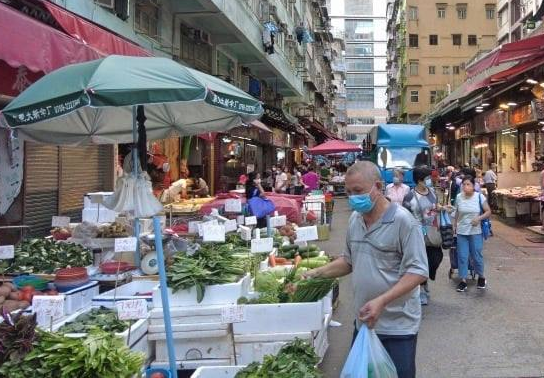
-
At least 35 cross-border vegetable truck drivers from China to Hong Kong tested positive for Omicron infection this month, sending about 400 hundred fellow drivers to quarantine and disrupting the supply chain
-
Vegetable prices in Hong Kong shot up and are expected to remain high after rising about three-fold since Chinese authorities closed the border
-
Interchange arrangement set up at border on HK chief executive’s request seen by drivers as increasing possible infections and driving up further veggie prices
Coronavirus hit at least cross-border truck drivers hauling vegetables from China to Hong Kong this month, sending about 400 of their fellow drivers to quarantine as close contacts and disrupting the supply chain, which left the city short of vegetables and other foodstuff.
The crisis began on February 4, when two Hong Kong truck drivers tested positive for the Omicron variant of COVID-19 after a trip to the mainland, prompting Shenzhen authorities to shut down the border to this type of logistics players.
Vegetable prices shot up in Hong Kong and are expected to remain high for a long time after rising about three-fold since the border closed to the food trucks for several days following the initial infections.
Fewer than 50 cross-border drivers are available to transport fresh goods from the mainland to Hong Kong, after 12 more of their colleagues were found infected with Covid-19 at several Shenzhen land ports last week, according to local newspaper reports.
Chief Executive Carrie Lam assured Hong Kong people after the first two positive cases that the trucks would be returning shortly to the Man Kam To border vegetable interchange to fetch the produce that mainland truckers picked up at source farms outside Shenzhen.
The relay arrangement was formulated by Shenzhen authorities after Lam approached Shenzhen officials to device a way to keep the flow of greens going, while avoiding any contagion from the Hong Kong drivers.
The solution brought little relief, as supply was just about 30% of the vendors’ daily uptake, and vegetable prices in Hong Kong’s wet markets fluctuated on a high range.
The price of choi sum, or Chinese flowering cabbage, ranges from HK$28 to HK$30 per catty, or 600 grams, when the favourite green of Hongkongers cost HK$7 before the Lunar New Year began on February 1.
Other vegetables cost no lower than HK$20 per catty in the wet markets. For example, eggplant that used to cost HK$9 for 2 pieces is being sold at HK$10 apiece and about 50% costlier in supermarkets, as the infections sparked a logistical problem that has disrupted the supply chain.
A member of the Hong Kong-Guangdong Transportation Drivers and Employees Association surnamed Cheung said under the new arrangement, cross-border drivers must pick up the goods at designated collection points in Shenzhen.
But the process has slowed traffic flow as only two border openings are used by the trucks.
Their mainland counterparts now fetch the goods at farms and pass them on to Hong Kong truck drivers at the interchange venues. Cheung said this system should be scrapped immediately so that he and his colleagues can pick up the goods directly from mainland farms.
He said the interchange arrangement increases the risk of infection between mainland and local drivers. At the same time, it will not bring down vegetable prices and other fresh goods, he said.
They will stay pricey for a very long time unless Hong Kong drivers get the goods directly from the suppliers, he said. This view was upheld by vegetable and fruit vendors in North Point, who say their margins had not risen despite surging prices.




